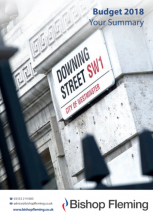Budget 2018 – what should the Chancellor do for tourism?
In the second of our thought leadership pieces ahead of the Budget on 29 October 2018, we take a look at what the Chancellor could do for hotels, tourism and leisure.
We sat down with Bishop Fleming Partner Will Hanbury to get his thoughts on the forthcoming Budget.
Q1 – What services does Bishop Fleming provide to the tourism sector?
Bishop Fleming provides tax advisory services to many tourism businesses in the South West. Our aim is to minimise their tax liabilities while ensuring they comply with the complexities of the legislation. We offer Insights into their business performance to help improve profitability.
In addition, we undertake financial reporting and audit and assurance services to ensure results are accurately reported and reflected in the financial statements.
Employments costs are a huge expense to the tourism sector and increasingly there is a significant level of legislation that needs to be adhered to at the very time business owners are under time pressure, which is why we offer a fully managed payroll service to clients in this sector
Q2 – What are the key measures you would wish to see the Chancellor announce for the tourism sector, and why?
I would like the government to provide incentives to assist with, and support, the increasing costs of the workforce.
Over the last few years the increase in the National Minimum Wage (NMW) and auto enrolment has eroded margins for many tourism businesses. The government’s policy on reaching a living wage of £9 by 2020 is only going to exacerbate this issue, which will potentially lead to some businesses closing.
The government needs to offer further tax breaks and incentives to encourage employers to recruit and train new staff. An increase to the employment allowance and easing access to the apprenticeship levy would assist with this.
To boost investment in UK business it would be helpful for the Chancellor to review the changes in tax treatment of goodwill. Re-introducing tax relief on purchased goodwill amortisation would help investment decisions by ensuring tax relief is received over the life of the asset rather than only on its disposal.
Q3 – Since April 2017 the IR35 legislation has forced public sector organisations that use contractors to establish if those workers are employees or self-employed. There is speculation that this will be rolled out into the private sector either in 2019 or 2020. How would this impact on the Westcountry’s tourism industry?
With the existing high level of bureaucracy and the demand for staff means owner-managed businesses can ill afford the time to continually assess the status of workers. It is to be hoped HMRC will delay any roll out into the private sector of this legislation until there is greater confidence and certainty around the availability of a skilled workforce.
Q4 – Should there be special visas for overseas workers to be employed in the tourist industry post Brexit?
Brexit is having a major impact on staffing.
Many hoteliers are reporting that they cannot fill their vacancies as overseas staff have felt the chill of Brexit, and in conjunction with the subsequent devaluing of sterling this has meant many tourism staff do not see working in the UK as an attractive proposition.
It is to be hoped that special work visas will be easily obtainable, and along with the continued increase in the NMW overseas workers will be encouraged to seek employment in the UK.
Q5 – EU rates of VAT in the tourism sector have been a source of discontent within the industry for a while. What could the government do to address this?
In my view, with Brexit on the horizon it is time for the government to consider changing the rate of VAT on services supplied to tourists. For years a number of member states made use of a dispensation to charge lower rates of VAT, including Ireland – which introduced a 9% rate in 2011.
Bearing in mind the financial pressure the sector is under, a cut in the rate of output VAT would go a long way to demonstrating genuine support for the sector. Such a cut in rates would be a real stimulus for employment and investment in the sector.
Q6 – How can evolving technology better help the sector to manage its administration and support visitors to the region?
Where manpower is in short supply, and becoming ever more expensive, the answer may well be to invest in technology.
Maintaining the Annual Investment Allowance is important for business. Introducing an enhanced allowance for major investment in technology projects as well as environmental projects would help tourism businesses make investment decisions.
Watch out for the Budget on 29 October!
Bishop Fleming will be covering the Budget on the day and will follow up announcements about the tourism sector with Will afterwards to see how well he thinks the Chancellor has done.





